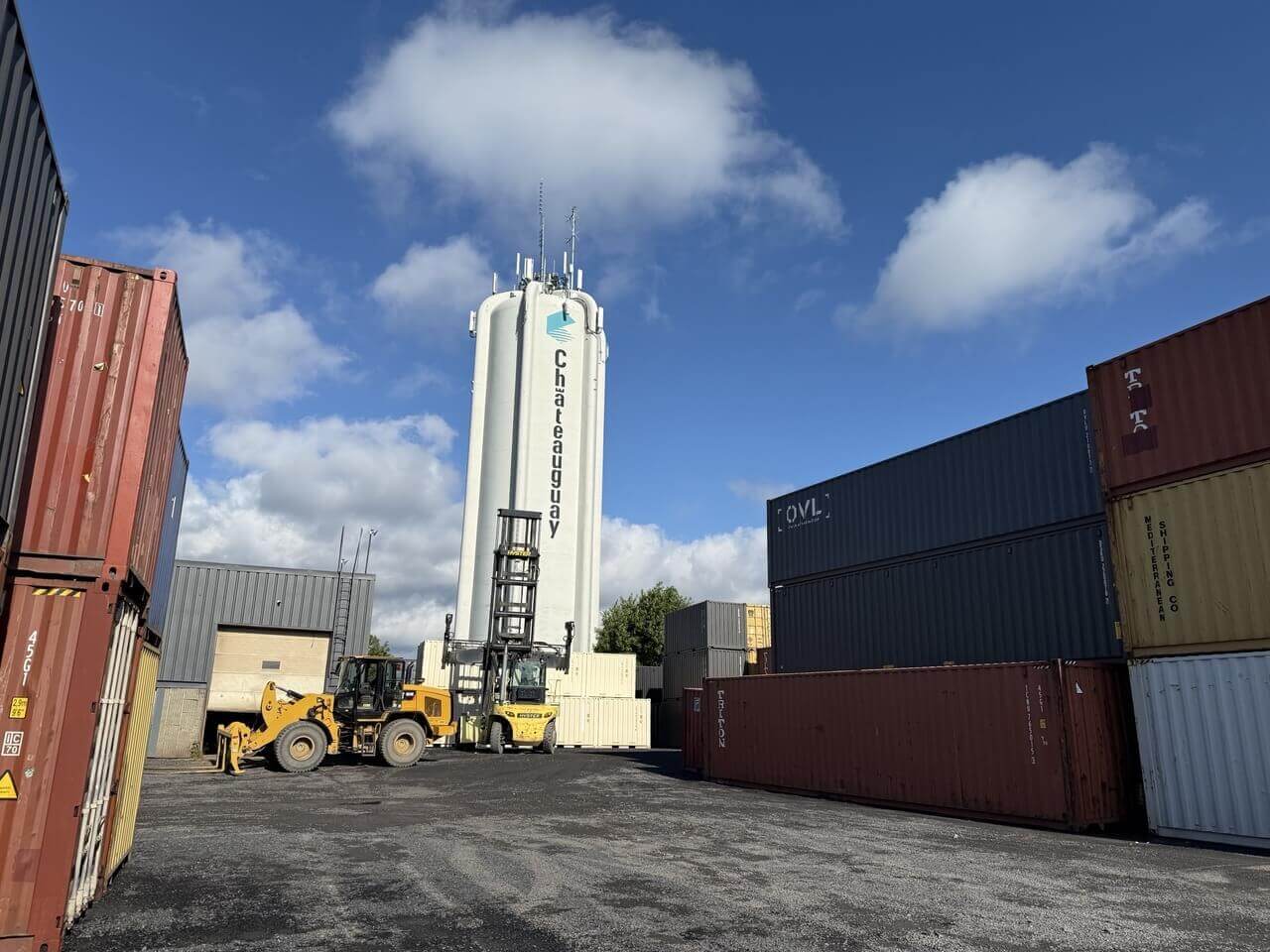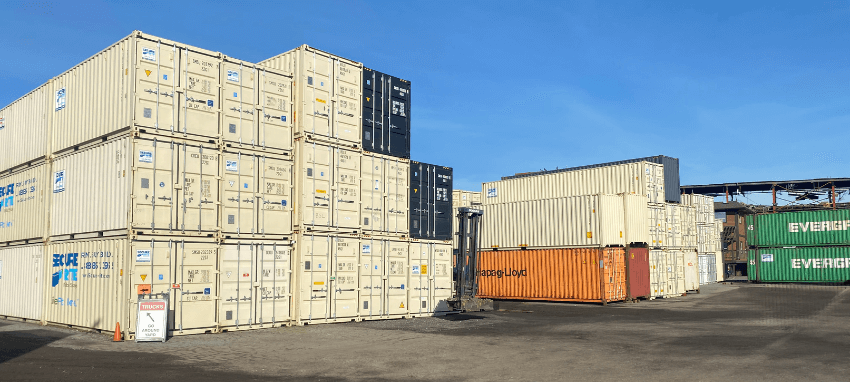Everything You Need to Learn About Shipping Containers and Their Practical Applications
Shipping containers have actually advanced from simple devices for transport to functional frameworks with numerous useful applications. Their durable layout and common sizing make them optimal for a variety of usages beyond shipping. From ingenious real estate remedies to sustainable farming, their adaptability is notable. The possibilities do not end there. Exploring their different features discloses shocking understandings into creative services and modern challenges. What various other duties could these containers play in today's world?
The Style and Framework of Shipping Containers

Inside, containers are created to make best use of area, often featuring wooden or steel flooring that can sustain significant weight. Ventilation systems may be incorporated to avoid wetness build-up, which is crucial for sensitive cargo. Additionally, strengthened corners allow for very easy handling by cranes and forklifts, facilitating seamless loading and dumping. This thoughtful style and structure contribute to the containers' convenience throughout various delivery and storage applications.
Benefits of Making Use Of Shipping Containers
While numerous transportation approaches have their benefits, using shipping containers attracts attention because of their unparalleled flexibility and efficiency. Shipping containers offer a standard size, making them easy to transport and stack throughout various settings of transportation, including ships, vehicles, and trains. This standardization decreases loading and unloading times, thus raising total productivity.
Shipping containers are constructed from durable products, supplying robust defense for products throughout transportation. They are weather-resistant and secure, lessening the risk of damages from environmental aspects or burglary. Additionally, the modular layout of shipping containers enables easy customization, making it possible for organizations to adapt them for numerous purposes, such as storage space or mobile workplaces.
Finally, their transportability and cost-effectiveness make shipping containers an attractive choice for companies aiming to simplify logistics and supply chain operations. These advantages add to the expanding appeal of shipping containers in numerous industries.
Imaginative Real Estate Solutions With Shipping Containers
Cutting-edge housing remedies have arised as an exciting application of shipping containers, leveraging their fundamental staminas for household use. These functional frameworks provide a sustainable alternative to typical structure materials, typically at a portion of the expense. Designers and developers have transformed containers into fashionable, useful homes, providing to varied way of livings and choices.

Shipping containers are eco friendly, advertising recycling and lowering waste. Numerous tasks concentrate on energy performance, integrating solar panels and environment-friendly roof coverings. As urbanization boosts, these innovative housing options provide a practical reaction to real estate lacks while promoting a distinct architectural visual.
Shipping Containers in Retail and Pop-Up Shops
A growing variety of merchants are transforming to delivering containers as a dynamic service for retail rooms and pop-up stores. These flexible frameworks provide an affordable choice to standard shops, permitting services to create one-of-a-kind, distinctive atmospheres that attract customers. Their modular layout enables easy transport and installment, making them excellent for seasonal or temporary retail places.
Stores can customize delivery containers to show their brand name identity, changing them into visually appealing stores that stand out in jampacked industries. The portable nature of containers likewise urges reliable usage of area, enabling creative layouts that maximize consumer circulation and involvement. Additionally, delivering containers can be situated in unusual areas, such as uninhabited lots or urban parks, increasing ease of access and foot website traffic.
As the retail landscape develops, delivering containers provide a adaptable and cutting-edge remedy that satisfies the needs of modern consumers while enhancing the shopping experience.
Sustainable Farming Practices Making Use Of Shipping Containers
Sustainable farming techniques significantly include shipping containers as innovative options for farming - sea can for sale. These container farms make use of hydroponics to make best use of space and resource efficiency, supplying an affordable strategy to food production. By transforming delivery containers into agricultural centers, farmers can address food safety and security and environmental concerns all at once
Container Farming Benefits
While standard agriculture faces difficulties such as land scarcity and environment adjustment, container farming presents a sensible option that makes best use of room and resources. This cutting-edge technique enables year-round crop manufacturing in regulated atmospheres, lowering dependence on climate problems. Container ranches make use of less water than conventional farming, advertising sustainability and preservation. They can be established in urban locations, bringing fresh fruit and vegetables closer to customers and minimizing transport exhausts. Additionally, the modular nature of shipping containers enables scalability, enabling farmers to adjust procedures based upon demand. Container farming likewise minimizes pesticide usage by producing an enclosed ecosystem, ultimately enhancing food safety. As metropolitan populaces expand, container farming becomes a sensible service to meet the enhancing need for neighborhood, sustainable food sources.
Hydroponics in Containers
Hydroponics, which permits plants to grow without soil by utilizing nutrient-rich water, thrives within the confines of shipping containers, making it a suitable method for urban agriculture. These containers develop a regulated setting that maximizes moisture, light, and temperature level, making it possible for year-round farming. With restricted room in city locations, delivering containers provide a scalable solution for expanding fresh produce. Hydroponic systems within containers can consist of various strategies, such as nutrient film strategy (NFT) and deep water culture (DWC), which make the most of yield while reducing water usage. This cutting-edge strategy not just boosts food security however also minimizes the carbon impact connected with typical farming approaches. Hydroponics in containers represents a forward-thinking service for sustainable city food production.
Economical Farming Solutions
As food production faces boosting obstacles because of climate adjustment and urbanization, delivering containers emerge as an affordable option for agriculture. These functional structures can be repurposed for various lasting farming methods, such as hydroponics and vertical farming. By utilizing controlled environments within containers, farmers can optimize growth cycles and reduce source consumption, including water and fertilizers. In addition, shipping containers can be purposefully put in metropolitan areas, minimizing transport costs and improving accessibility to fresh fruit and vegetables. Their modular nature permits scalability, allowing farmers to increase operations as need expands. In addition, repurposing containers adds to waste reduction, lining up with environmentally friendly farming initiatives. Overall, delivering containers existing innovative chances for sustainable and reliable food manufacturing.
Emergency and Disaster Relief Applications of Shipping Containers

Organizations often make use of shipping containers to produce mobile facilities or field medical facilities, making sure that healthcare reaches those in need. In addition, they can be transformed right into command centers for coordinating rescue procedures, consequently boosting business performance throughout dilemmas.
Containers can be modified to save essential items such as food, clothing, and water, safeguarding materials till they are distributed. Their mobility enables them to be conveniently transported to various areas, making certain that aid shows up where it is most urgently needed. Overall, delivery containers play a crucial duty in boosting the performance of calamity relief initiatives worldwide.
Frequently Asked Questions
How Are Shipping Containers Transported From One Area to An Additional?
Shipping containers are moved via ships, trains, and vehicles, utilizing cranes for filling and discharging. This multi-modal transport system guarantees reliable motion across land and sea, attaching worldwide supply chains and helping with international profession.
What Is the Typical Life Expectancy of a Shipping Container?
The ordinary life expectancy of a shipping container typically varies from 10 to 25 years, relying on upkeep, usage, and ecological factors. Correct treatment can extend their usability, while overlook may cause deterioration and damage.
Can Shipping Containers Be Changed for Different Usages?
Yes, shipping containers can be customized for various uses. They work as homes, offices, pop-up stores, and storage space devices. Their adaptability permits creative adaptations, making them ideal for a wide variety of applications.
Are Shipping Containers Ecologically Friendly?
Shipping containers can be eco-friendly, as they promote repurposing and reusing. Their toughness lowers waste, while their use in alternate housing and services reduces the need for new products, adding to lasting techniques.
Exactly how Do I Choose the Right Dimension Shipping Container?
To pick the right dimension shipping container, one have to assess storage requirements, take into consideration the desired usage, and evaluate space accessibility - shipping container storage. Usual sizes include 20-foot and 40-foot containers, each serving various storage and transport requirements efficiently
Ingenious housing services have emerged as an amazing application of delivery containers, leveraging their fundamental toughness for residential use. The adaptability of delivery containers enables for creative formats, from single-unit houses to complicated multi-container plans. Lasting farming practices significantly include delivery containers as cutting-edge remedies for farming. In addition, the modular nature of delivery containers allows scalability, permitting farmers to adjust procedures based on need. Hydroponics, which allows plants to expand without soil by making use of nutrient-rich water, prospers within the confines of delivery containers, making it an ideal technique for urban farming.